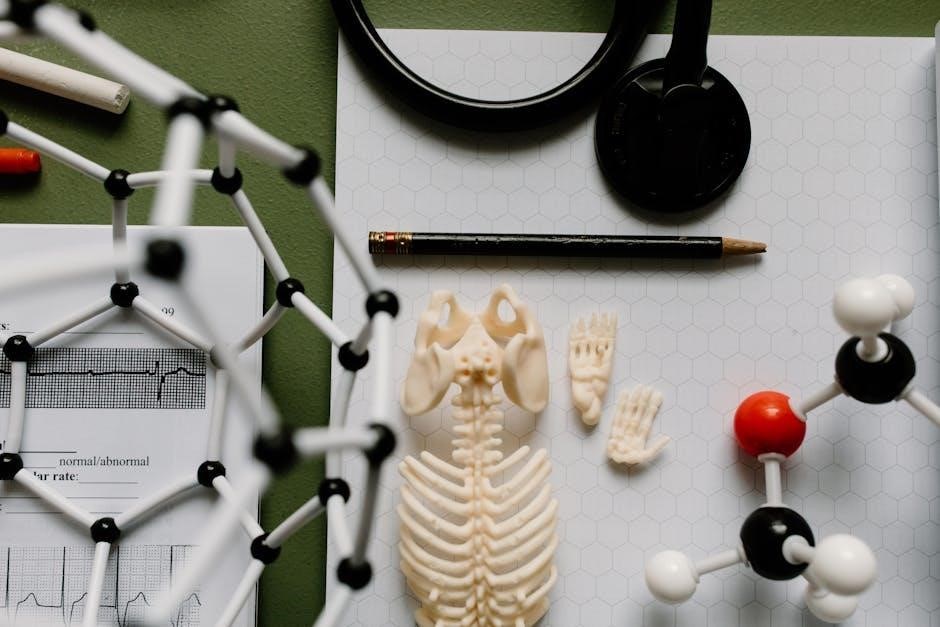nurse study guide
A nurse study guide is a comprehensive resource designed to help nursing students prepare for exams and clinical practice. It includes key topics, practice questions, and strategies to master nursing concepts effectively, ensuring a structured approach to learning and professional success.
1.1 What is a Nurse Study Guide?
A nurse study guide is a comprehensive educational tool designed to assist nursing students in mastering essential concepts, clinical skills, and exam preparation strategies. It typically includes detailed content summaries, practice questions, and evidence-based resources to enhance learning and professional development.
1.2 Importance of Using a Nurse Study Guide
A nurse study guide is essential for exam success, as it organizes complex information into manageable sections, enhances retention, and provides practice questions to assess readiness. It helps build confidence and ensures a structured approach to mastering nursing concepts and clinical skills effectively.

Key Topics to Master in Nursing
Mastering fundamentals, medical-surgical nursing, pharmacology, and maternal-neonatal care is crucial for nursing success. These topics form the foundation of nursing practice and are essential for exam preparation and real-world patient care.
2.1 Fundamentals of Nursing
Fundamentals of nursing cover essential skills and concepts, such as patient assessment, vital signs, infection control, and ethical practices. These basics are crucial for building a strong foundation in nursing care, ensuring safe and effective patient interactions from the start of a nursing career.
2.2 Medical-Surgical Nursing
Medical-surgical nursing involves caring for adult patients with various medical conditions and surgical procedures. It focuses on assessing patient needs, managing medications, and providing post-operative care. This area requires a strong understanding of pathophysiology, pharmacology, and evidence-based practices to ensure optimal patient outcomes and recovery.
2.3 Pharmacology and Medications
Pharmacology focuses on understanding drug classes, their mechanisms, side effects, and interactions. Nurses must master dosage calculations and administration routes to ensure safe, effective patient care. This includes recognizing adverse reactions and adhering to medication protocols, all while applying the nursing process to tailor care to individual patient needs.
2.4 Maternal-Neonatal Nursing
Maternal-neonatal nursing focuses on prenatal, labor, delivery, and postpartum care. It emphasizes newborn assessment, recognizing complications, and promoting parent-infant bonding. Nurses must understand fetal development, obstetric medications, and interventions to ensure safe, effective care for mothers and newborns, addressing both physiological and emotional needs during this critical life transition.

Recommended Study Resources and Materials
Top study resources include NCLEX-RN exam guides like Nurse Plus Premium, video lectures, and interactive tools. These materials offer practice questions, flashcards, and detailed rationales to enhance nursing knowledge and exam readiness effectively.
3.1 Best NCLEX-RN Study Guides
Premium resources like Nurse Plus Premium and Saunders Comprehensive Review are top choices for NCLEX-RN prep. These guides offer thousands of practice questions, detailed rationales, and exam simulators, providing a comprehensive approach to mastering nursing concepts and clinical judgment, essential for exam success and professional competence in patient care.

3.2 Online Courses and Video Lectures
Online platforms offer extensive video lectures and structured courses, such as Osmosis and Lecture Series, providing over 27 hours of content. These resources cover key nursing topics, allowing students to learn at their own pace and supplement their studies with interactive tools, enhancing their understanding and retention of critical material for exam preparation.
3.3 Interactive Tools and Apps
Interactive tools like RNPrepPro and NCLEX Flash Notes offer dynamic study experiences. Apps provide flashcards, Q&A pairs, and customizable practice questions, enabling efficient revision. These resources enhance engagement and retention, helping nursing students master complex concepts and clinical judgment skills essential for exam success and professional practice.

Effective Study Strategies for Nursing Students
Active learning, spaced repetition, and using flashcards are proven strategies. Prioritize understanding over memorization and integrate practice questions into your routine for better exam readiness and clinical application.
Stay organized, set realistic goals, and review consistently. Incorporate video lectures and interactive tools to enhance engagement and retention, ensuring a well-rounded approach to nursing education.
4.1 Active Learning Techniques
Active learning involves engaging with content through discussions, simulations, and problem-solving. Nursing students benefit from group activities, case studies, and teaching others, which reinforce understanding and retention of complex concepts.
Practical applications, such as real-world scenario simulations, help bridge theory and practice. Regular spaced repetition and interactive tools further enhance learning efficiency and clinical preparedness for future nurses.
4.2 Creating a Personalized Study Schedule
A well-structured study plan tailored to individual needs enhances learning efficiency. Allocate specific time slots for each nursing topic, ensuring balanced coverage of fundamentals, pharmacology, and clinical scenarios. Incorporate regular practice questions and review sessions to reinforce knowledge retention and identify areas needing improvement.
4.3 Using Flashcards for Quick Revision
Flashcards are an excellent tool for rapid review of nursing concepts, allowing focused study on key terms and medications. Use them to reinforce memory of pharmacology, medical-surgical conditions, and maternal-neonatal care. Portable and concise, flashcards enable efficient learning on-the-go, complementing other study methods for comprehensive exam preparation.

Practice Questions and Simulations
Practice questions and simulations are essential for NCLEX preparation, enhancing clinical judgment and familiarity with exam formats. Utilize them to improve problem-solving skills and confidence.
5.1 Benefits of NCLEX Practice Questions
NCLEX practice questions provide realistic exam simulation, helping candidates identify weak areas and improve clinical judgment. Regular use enhances time management, reduces anxiety, and boosts confidence, ensuring better preparation for the actual test.
5.2 How to Use Question Banks Effectively
Utilize question banks by creating a study plan, reviewing detailed rationales, and tracking progress. Focus on weak areas, set timed sessions, and analyze performance to enhance understanding and improve clinical judgment skills for exam success.
5.3 Simulation Centers for Hands-On Practice
Simulation centers provide realistic, hands-on practice for nursing students, replicating real-life patient scenarios. These centers allow learners to apply theoretical knowledge, develop clinical skills, and build confidence in a risk-free environment. They are essential for mastering patient care techniques and preparing for diverse clinical situations effectively.

Understanding the NCLEX Exam Format
The NCLEX exam assesses nursing knowledge and clinical judgment through various question types, including multiple-choice and interactive formats. Understanding the format helps candidates prepare effectively for the test.
6.1 Types of Questions on the NCLEX
The NCLEX features multiple-choice questions, hotspots, drag-and-drop items, and extended drag-and-drop tasks. These formats test clinical knowledge, prioritization, and decision-making skills, ensuring candidates can apply nursing concepts in real-world scenarios effectively.
6.2 Scoring System and Passing Requirements
The NCLEX uses a pass/fail scoring system, with a minimum of 75 questions required. Candidates must achieve at least 450 on each section to pass, demonstrating safe and effective nursing care. The scoring reflects the ability to apply knowledge in clinical scenarios, ensuring competence in patient care.
6.3 Clinical Judgment Measurement Model
The Clinical Judgment Measurement Model (CJMM) is the foundation of the next-generation NCLEX; It assesses a nurse’s ability to recognize cues, analyze data, prioritize hypotheses, and generate solutions. This model evaluates critical thinking and decision-making skills, ensuring nurses can provide safe and effective patient care in dynamic clinical environments.

Time Management and Test-Taking Tips
Effective time management and test-taking strategies are crucial for NCLEX success. Allocate time wisely per question, prioritize easier ones first, and use elimination techniques to reduce errors and boost confidence.

7.1 Strategies for Managing Time During the Exam
Allocate 1-2 minutes per question to maintain steady pacing. Tackle high-confidence questions first to secure easy points, then revisit challenging ones. Use the process of elimination to narrow down options, ensuring systematic approach and reducing time spent on each question effectively.
7.2 Approaches to Tackle Different Question Types
For multiple-choice questions, identify key terms and use the process of elimination. Select-all-that-apply (SATA) questions require careful reading to avoid errors. Prioritize high-weightage formats like drag-and-drop or hotspots, ensuring attention to detail. Practice mixed question types to build adaptability and confidence in handling diverse exam formats effectively.
7.3 Reducing Exam Anxiety
Practice mindfulness and deep-breathing exercises to calm nerves. Maintain a healthy diet, stay hydrated, and ensure adequate rest. Engage in physical activity to reduce stress. Use positive affirmations to build confidence. Visualize success and focus on preparedness to manage anxiety effectively during the exam.

Final Preparation and Tips
Ensure adequate rest, maintain a healthy diet, and stay hydrated. Review key strategies and practice last-minute questions. Stay positive, and rely on your preparedness to approach the exam confidently.
8.1 Last-Minute Study Tips
Focus on weak areas identified through practice tests, review flashcards for quick concept recall, and stay calm. Prioritize key topics like pharmacology and medical-surgical nursing. Engage in active learning techniques and ensure adequate rest to maintain mental clarity for optimal performance on exam day.
8.2 Importance of Rest and Health
Adequate sleep and proper nutrition are crucial for cognitive function and stress reduction. Regular exercise and mindfulness practices enhance focus and overall well-being. Maintaining a healthy lifestyle ensures peak performance during studies and exams, contributing to long-term success in nursing education and practice.
8.3 Reviewing Key Strategies
Consistently revisiting study techniques, practice questions, and exam strategies ensures reinforcement of learning. Regularly reviewing notes and materials helps solidify knowledge and identifies areas needing improvement, providing a clear path to achieving exam success and professional competence in nursing.
9.1 Summarizing Key Points
Mastering nursing concepts requires a structured approach, utilizing resources like NCLEX practice questions, study guides, and interactive tools. Effective strategies, including active learning and time management, are essential. Prioritizing rest and health ensures a balanced preparation, leading to confidence and success in the nursing profession and beyond.
9.2 Encouragement for Future Nurses
Nursing is a rewarding profession that impacts lives profoundly. Stay committed, embrace challenges, and trust in your preparation. Utilize study guides and resources like NCLEX practice questions to build confidence. Your dedication will pave the way for a successful and fulfilling career in nursing, making a difference every day.











Leave a Comment